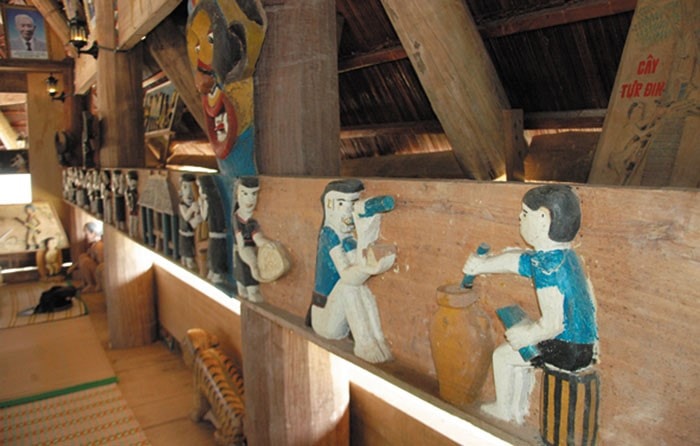Co Tu ethnic wood carving in Quang Nam
(QNO) - Wooden carvings expressing Co Tu ethnic daily activities, their spiritual life and beliefs are being well preserved through generations.
 |
| Some Co Tu ethnic wooden carvings |
About 40 thousand people of the Co Tu community in Quang Nam are living in a large mountainous area along Vietnam-Laos border, mainly in Dong Giang, Tay Giang and Nam Giang districts. Their cultural and spiritual lives are rather varied with their own culture, customs, rituals and festivals. Wood carving is one of the original arts by which their tangible and intangible cultural values are preserved.
Wooden carvings can be found everywhere in the Co Tu villages. They are used for decoration. The traditional Guol houses (the common houses of Co Tu villages) may be the place where Co Tu wood carving is best manifested in accordance with the Co Tu traditional designs and patterns, the place to show the essence of carving and painting in house building. Therefore, the Guol becomes one of the symbols, the pride of the Co Tu ethnic group.
The Co Tu ethnic wooden carvings are usually simple but reflect their outlook of life and worldview. They describe the sky and the earth, Co Tu customs, habits and daily activities vividly and colorfully such as drinking, screening rice, pounding rice, tan tung ya ya dancing, playing wind instruments, beating gongs and drums, forging, or hunting. The main colors in Co Tu ethnic wooden works are indigo (colour of the earth) and red (colour of the sun). They are extracted from plants available in this area.
It can be said that Co Tu ethnic wooden carvings are unique works of art made only by the Co Tu artisans’ experience, capacity of observation and creation, and by the techniques passed through generations.
